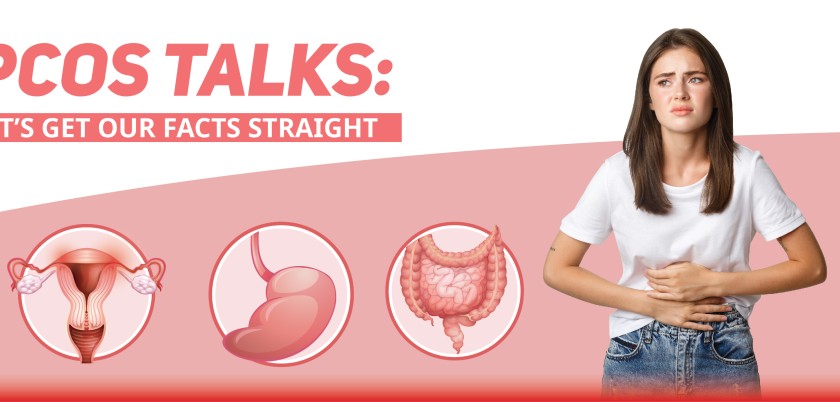
PCOS talks: Let's get our facts straight
Loose weight or stopping eating carbs are some of the common pieces of advice you may have heard to manage your PCOS. But is that it? Is obesity connected to PCOS? Will cutting down carbs really help?
Let us dig a little deeper.
Polycystic ovarian syndrome (PCOS) is an endocrine disorder affecting your reproductive health.
The prevalence of PCOS is increasing in India and around 65% percent of women with this condition are found to be obese.
While weight gain is just the tip of the iceberg, you may experience symptoms such as male pattern baldness or thinning of hair, acne, excessive body hair growth (hirsutism), mood swings, eating disorders, and anxiety.
Perception of PCOS is highly varied; Some are overwhelmed, and some are unaware of their symptoms. September is designated as a PCOS Awareness month to educate, normalize, help and improve the lives of people with PCOS.
Without any further ado, let’s answer some of the questions we had!
WHY LOSING WEIGHT IS IMPORTANT IN PCOS?
As we all know, obesity is the excessive fat accumulation and can predispose to several diseases such as cardiac problems and diabetes. However, obesity is not going to be the only reason for you to develop PCOS.
But still, it could worsen the symptoms and outcomes.
Obesity is a chronic inflammatory state associated with a myriad of metabolic dysfunction.
Insulin helps the cells to take up glucose from the blood and therefore control our blood sugar levels.
Obesity is linked with insulin resistance where the cells won’t respond to insulin secretion, leading to Hyperinsulinemia (increased insulin secretion).
This hyperinsulinemia causes your body to produce an excess of male sex hormones causing all your symptoms.
So, management of obesity along with other lifestyle modifications will give you a better chance of handling your symptoms.
TIPS THAT WOULD HELP YOU IN YOUR PCOS JOURNEY
1. GETTING SMART WITH CARBS!
With insulin in play, we must maintain our carbohydrate intake. But it does not mean you should avoid everything right away.
Choose foods rich in complex carbohydrates. Complex carbs contain dietary fiber which helps in your blood glucose control.
You can include fruits, all kinds of vegetables, whole grains, legumes, and pulses in your diet. Plant sources of food not just contain fiber but also phytochemicals which aid in better insulin sensitivity.
Restrict the number of refined carbs in your diet such as sugary drinks, pastries, sweets, cakes, chips, ultra-processed foods, etc. They spike your blood glucose levels adding to the symptoms.
2. DOES LOSING WEIGHT MEAN NO FAT?
Not at all. It all depends on what kinds of fat you choose.
Consuming foods rich in omega-3fatty acids have a positive effect on insulin resistance. Also, they are Anti-inflammatory and Anti-oxidants.
Seeds such as flax seeds, chia seeds, and nuts like walnuts are good sources of omega-3 fatty acids. Fatty fishes such as sardine, and tuna also contain this nutrient.
Tone down the intake of saturated fats and trans fats such as meat, fast foods, fried foods, etc.
3. MAINTAINING A HEALTHY GUT!
Studies have shown that probiotics and prebiotics have a significant effect in treating metabolic abnormalities.
So, keeping your gut microbiota healthy is important.
A high-fiber diet including fruits and vegetable aid in maintaining a healthy gut microbiome. Your inflammation can also be kept under control.
You can also include a variety of probiotics such as curd, yogurt, kefir, and sauerkraut.
The benefits of a happy gut not just stop with your insulin sensitivity but also keeps your mood swings at bay.
4. FOCUSING ON MICRONUTRIENTS!
A diet loaded with magnesium, zinc, and selenium assists your body with different metabolism, enzyme function, and combating oxidative stress.
You may not get all of these minerals in one superfood but a variety of foods will help you meet your requirement.
You can include greens like kale and spinach, dark chocolate, nuts, whole grains, and legumes are all rich in these nutrients.
For more information about other micros and foods to include you can go back to our blog on
(Provide link for Beat PCOS with these foods)
5. MANAGE YOUR SLEEP CYCLE!
A healthy relationship not only with food but also with your sleep will help you in keeping your hormones balanced.
Get enough sleep at night!
Weight loss can help in managing your PCOS symptoms. However, it is not a one-stop solution. Eating a nutrient-dense diet along with a proper lifestyle will make your goals with PCOS achievable. Feeling better? Reach out to us to get your tailor-made PCOS-friendly diet plan.






